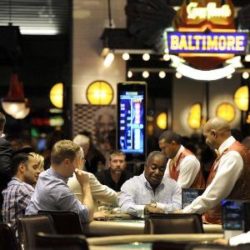The State of Maryland’s Gambling Industry

In 2008, Maryland approved the placing of slot machines at its land-based casinos, with table games added to the gambling mix four years later. Over the ensuing decade, Maryland’s casino markets has gone from strength to strength, and this year is no exception with the state’s six casinos having generated four consecutive months of year-on-year growth over the first four months of 2018.
Furthermore, punters are now able to take advantage of a whole range of other gambling options in the state, such as fantasy sports betting and horse racing, with the recent ruling by the Supreme Court also potentially opening the doors for a further expansion into live sports betting and online gaming in the near future.
Six Land-Based Casinos
In 2010, Hollywood Casino Perryville became the first facility to open its doors for business, with the state’s most recent addition being the spectacular $1.2 billion MGM National Harbor in Prince George’s County, which opened in December 2016.
For the first four months of this year, Maryland’s six casinos have subsequently generated more than $414 million in revenue, of which around $150 million has been collected by way of state and local taxes. Meanwhile, since the industry was launched, the Maryland Education Trust Fund has received more than $2.1 billion in order to help fund the state’s public schools, with other beneficiaries and worthy causes including local impact and small business grants.
Record $150m Collected in March
In March, the state’s casinos set a new monthly revenue record of $150 million, demolishing the previous high of $141.1 million posted in March 2017. In April, revenue was also higher by 6% to $143 million, with MGM National Harbor leading the way with $57.7 million in revenue (+15.6%), followed by Live! Casino with $46.8 million (+3.3%), Hollywood Casino Perryville with $6.9 million (+7.3%), Ocean Downs with $5.5 million (+14.8%); and Rocky Gap with $4.7 million (+2.8%).
In fact, all but the Horseshoe Casino Baltimore saw their year-on-year business improve, with the latter mostly negatively impacted by its proximity to the largest city in Maryland which has reported more than 100 homicide already this year.
Transforming Baltimore Area
Nevertheless, plans are underway to transform the area into an attractive entertainment district, complete with a corridor linking the casino with other notable nearby attractions, such as sporting stadiums and Baltimore’s Inner Harbor, which boasts numerous museums, monuments, and restaurants. In other words, a revamp of Maryland’s most run down district may soon provide a new boost to the state’s tourist and casino market, and as Kevin Butler, president of Hammerjacks Entertainment Group, explains:
“You’ve got a billion dollars worth of stadiums as neighbors, the casino is now open and I envision this resembling a Bourbon Street atmosphere with restaurants and nightlife. And there’s plenty of parking.”
Online Gambling Legislation
In 2013, New Jersey launched its online gambling market in an attempt to help its land-based casinos contend with increasing competition from neighboring states such as Maryland, Pennsylvania and New York. Having overcome a number of teething problems in its initial years, the industry currently generates around $225 million in annual revenue for New Jersey, which has subsequently motivated Pennsylvania to pass online gambling legislation of its own last year, with Maryland also studying the industry intensely before potentially following suit.
Moreover, Maryland stands to benefit economically from being a later mover to the market, and can save time and money by implementing a similar framework as New Jersey, complete with online licenses offered to the state’s land-based casinos, and the setting of reasonable tax rates. Furthermore, a poker player sharing network was launched on May 1st involving New Jersey, Nevada, and Delaware, and potentially Pennsylvania next year, meaning Maryland will have direct access to a viable and attractive poker market in the event of online poker legislation being adopted.
Keeping Up with Competition
Over the past few years, states across the country have increasingly turned towards the casino industry to help balance budgets and produce new revenue streams for local government coffers. While individual states have seemed less than keen to pass legislation allowing their online equivalents, that may all be about to change after this month’s Supreme Court landmark ruling in favor of sports betting. As sports wagering is closely linked with the online gambling industry, and more than a dozen states are currently mulling regulating the industry, this creates a strong argument for Maryland taking its industry online in order to better keep pace with its competitors.










